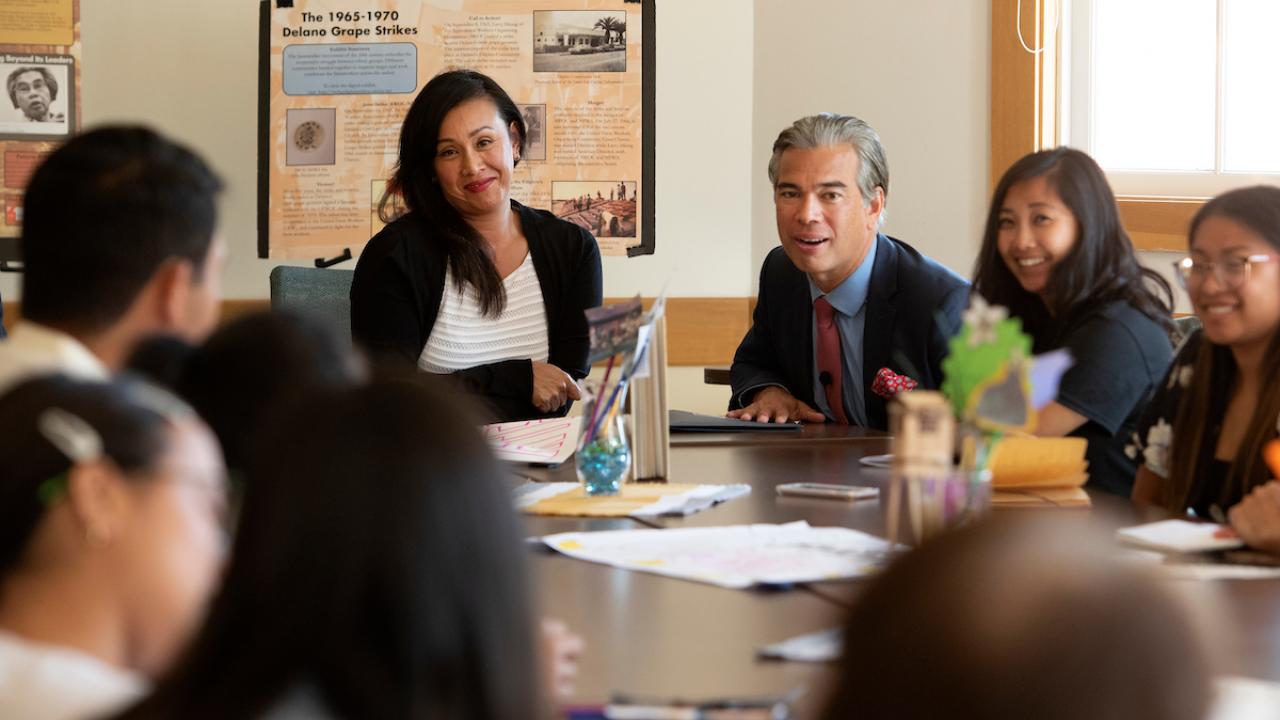Quick Summary
- Announcement comes during Filipino American History month
- Assemblyman Rob Bonta congratulates center students and faculty at event Thursday
The new Bulosan Center for Filipino Studies at University of California, Davis, is receiving $1 million in state funding to expand research on one of the nation’s largest and fastest growing Asian American communities.
The funding was announced by Assemblyman Rob Bonta, D-Alameda, who championed the funding, at an event on campus Thursday (Oct. 24).
“This is a time for celebration,” Bonta said at a gathering of students, faculty and university representatives. Calling to mind his and his family’s own place in Filipino history, he said he was pleased to champion funding for a center that would research the important role Filipinos have played in California and national history. “I hope this is just a down payment for ongoing funding.”
The center, part of the Department of Asian American Studies in the College of Letters and Science, is named for Carlos Bulosan, a Filipino American migrant worker, labor activist and writer best known for his 1946 book America Is in the Heart.
“This allocation provides a crucial early boost to a center focused on an area that deserves more study,” said Robyn Rodriguez, director of the center and chair of Asian American studies. “It gives the center, the first of its kind at a major research university, a very strong start in better researching the second largest Asian American group in the nation.”
State assemblyman champions funding
The state allocation was announced during national Filipino American History Month. The funding will enable the center to hire staff, support graduate students, launch a major national survey on Filipino American health and well-being, continue research on Filipino migrant workers, expand the digital archive and oral history projects, and start an annual national conference on Filipino studies.
The Filipino American community of 3.5 million is one of the nation’s largest Asian American groups. About 1.5 million Filipino Americans live in California: 500,000 in the Los Angeles region, 300,000 in the San Francisco Bay Area, and 75,000 in greater Sacramento. UC Davis has about 1,800 Filipino American students and a wide range of student groups and clubs.
“The Filipino American community is one of the oldest immigrant groups in California, but our community’s place in California history and U.S. history more broadly — from leading the farmworker movement to fighting during World War II — is not widely known or taught,” Rodriguez said. “As one of the largest and fastest growing Asian American communities, Filipino Americans’ contemporary issues will require deeper investigation and understanding. We are excited to lead efforts to expand the field of Filipino studies.”
Among the issues that need more immediate research and attention, she said, are the experiences of undocumented Filipinos and the trafficking and exploitation of workers from the Philippines.
Digital archive, other projects underway
Planning for the center began in 2011. One of the first major initiatives was the Welga Project, launched in 2014 with funding from California Humanities to document and preserve the histories of Filipino Americans’ contribution to the farmworker movement in California. It has expanded to include histories of Filipino American activism and political engagement. Since its founding in late 2018, the center has also raised $30,000 in private donations from across the state and nation.
“The aim of the center is to uplift the voices of the most marginalized in the Filipino community in the United States and the diaspora,” Rodriguez said. “Its programs are driven by close collaboration with community-based organizations.”
Media Resources
Jerome Parra, Assemblyman Rob Bonta's office, 916-319-2018, jerome.parra@asm.ca.gov
Jeffrey Day, College of Letters and Science, 530-219-8258, jaaday@ucdavis.edu
Karen Nikos-Rose, News and Media Relations, UC Davis, 530-219-5472, kmnikos@ucdavis.edu
